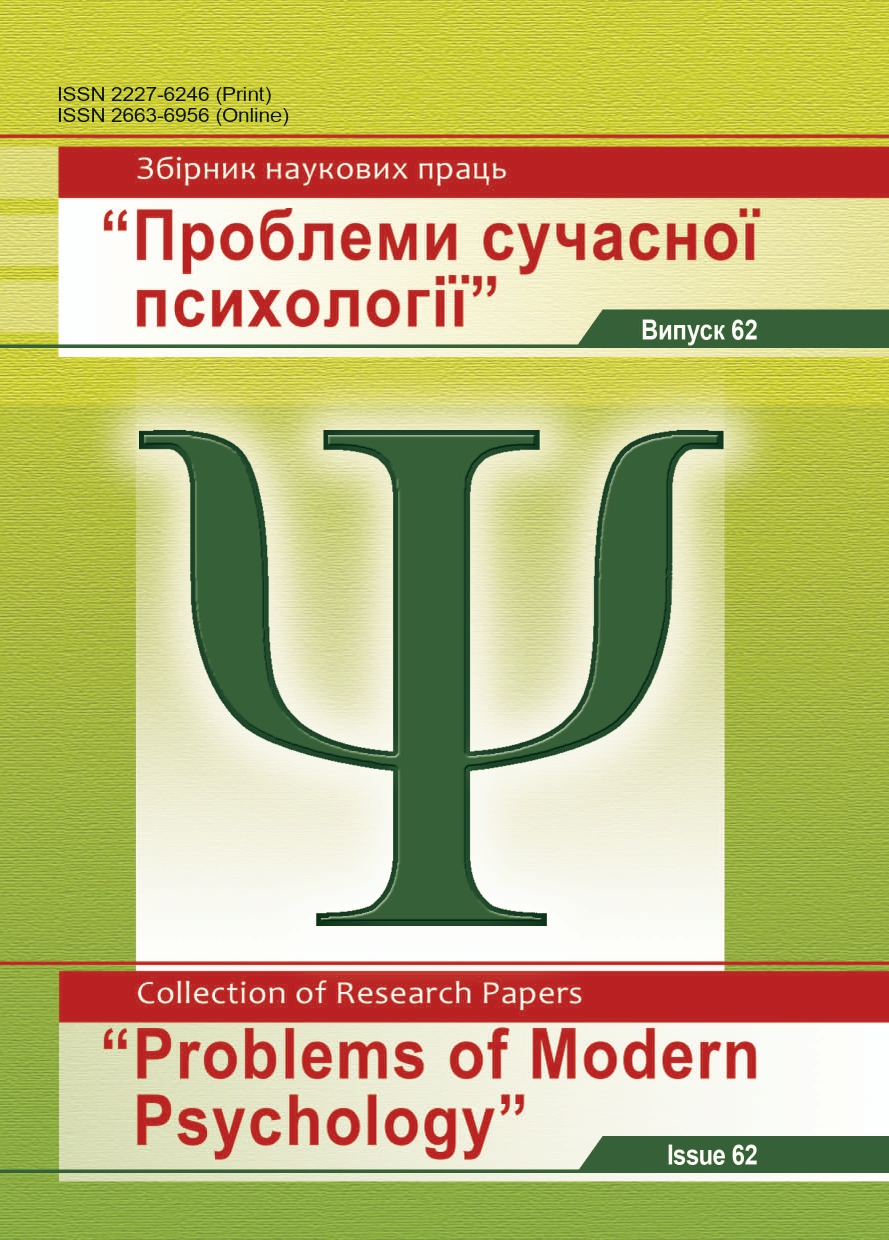Психоаналітичний аналіз посттравматичних стресових розладів
DOI:
https://doi.org/10.32626/2227-6246.2023-62.85-105Ключові слова:
посттравматичні стресові розлади, військово- травматичний стрес, демобілізація, бути в небезпеці, патологічні спогади, нездатність пригадати, амнезія відносно деяких подій, надмірна збудливість, гіперчутливістьАнотація
Мета статті – здійснити психоаналітичний аналіз посттравматичних стресових розладів; розглянути такий тип ПТСР, як військово-травматичний стрес; описати умови, які викликають військово-травматичний стрес.
Методи дослідження. Для розв’язання поставлених завдань використовувалися такі теоретичні методи дослідження: категоріальний, структурно-функціональний, аналіз, систематизація, моделювання, узагальнення. Метод організації емпіричного дослідження був використаний у якості експериментального методу. Також було використано метод Позитивної Психотерапії.
Результати дослідження. Доведено, що до основних симптомів синдрому ПТСР в учасників бойових дій у результаті сучасної війни росії з Україною відносяться: патологічні спогади (нав’язливі повернення до ситуації війни); порушення сну; нездатність пригадати або амнезія відносно деяких подій (уникнення всього того, що нагадує про бойові події); надмірна збудливість (неадекватна надмірна здатність до мобілізації); гіперчутливість (підвищена пильність щодо виникнення екстремальних чинників).
Висновки. Вважаємо різновидом ПТСР військово-травматичний стрес. На нашу думку, він виникає у безпосередніх учасників бойових дій. Виникненню військово-травматичного стресу сприяють певні умови, а саме: різка зміна умов мирного цивільного життя на бойові умови, до яких необхідно швидко пристосовуватися. В таких умовах людина постійно перебуває у небезпеці, є свідком руйнувань, пожеж, смертей (як знайомих, так і незнайомих людей); різка зміна ситуації бойових дій на мирне життя. До цієї ситуації учаснику бойових дій необхідно адаптуватися знову і знову. Дезадаптаційні процеси, що виникають саме в цей період, вирізняються своєю тривалістю та мають назву власне ПТСР. Повертаючись до звичайного мирного життя внаслідок закінчення бойових дій або внаслідок демобілізації, людина часто залишається адаптованою до ситуації бойових дій.
##submission.downloads##
Опубліковано
Як цитувати
Номер
Розділ
Ліцензія
Авторське право (c) 2023 Харченко Євген, Куриця Денис

Ця робота ліцензується відповідно до Creative Commons Attribution-NonCommercial 4.0 International License.
Редакція має повне право публікувати у Збірнику оригінальні наукові статті як результати теоретичних і експериментальних досліджень, які не знаходяться на розгляді для опублікування в інших виданнях. Автор передає редколегії Збірника права на розповсюдження електронної версії статті, а також електронної версії англомовного перекладу статті (для статей українською та російською мовою) через будь-які електронні засоби (розміщення на офіційному web-сайті Збірника, в електронних базах даних, репозитаріях та ін).
Автор публікації зберігає за собою право без узгодження з редколегією та засновниками використовувати матеріали статті: а) частково чи повністю в освітніх цілях; б) для написання власних дисертацій; в) для підготовки абстрактів, доповідей конференцій та презентацій.
Автор публікації має право розміщувати електронні копії статті (у тому числі кінцеву електронну версію, завантажену з офіційного web-сайту Збірника) на:
- персональних web-ресурсах усіх Авторів (web-сайти, web-сторінки, блоги тощо);
- web-ресурсах установ, де працюють Автори (включно з електронними інституційними репозитаріями);
- некомерційних web-ресурсах відкритого доступу (наприклад, arXiv.org).
Але в усіх випадках обов’язковою є наявність бібліографічного посилання на статтю або гіперпосилання на її електронну копію, що містяться на офіційному сайті Збірника.






